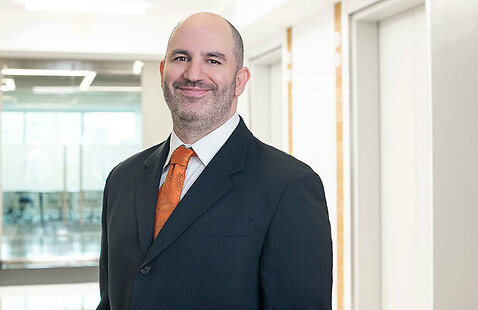Overview
Our structured finance litigation team has handled a wide range of matters over the past three decades, largely in the mortgage securitization space. Dating back to 1994, when the market for collateralized mortgage obligations (CMOs) collapsed and Orange County, California declared bankruptcy, our team has been immersed with these complex financial products and defended well over 200 lawsuits (many of which were class actions or aggregated claims), arbitrations and enforcement proceedings brought by financial and securities regulators nationwide. These are a few of the complex matters we have handled throughout the country:
Collapse of CMO Market (1994)
We defended a large closed- and open-end fund complex in bet-the-company proceedings that began in 1994, following the collapse of the CMO and derivative-backed mortgage securities market that caused investors to lose well over $1 billion. Most of the litigation centered on allegations that assets in several mutual funds, closed-end funds and private accounts, all touted as safe and conservative, were invested in exotic mortgage-backed securities amounting to a high risk gamble on the direction of interest rates. When the federal funds rate rose precipitously in 1994, the value of these funds and accounts declined precipitously. We handled all of the ensuing litigation nationwide, including a multi-month trial against the SEC which we won. The SEC's appeal of the decision was rejected.
Bet-the-Company for Mutual Fund Advisor (2003)
Ten years later, in late 2003, another large mutual fund advisor learned that it was being sued by the SEC in a bet-the-company case arising from over $100 million in losses in two mutual funds that had taken large positions in CMOs and other derivatives. After a nationwide search for trial counsel, the advisor replaced its usual East Coast, thousand-lawyer firm and retained Stinson. The case involved complex pricing questions of thinly-traded CMOs and derivatives in a highly-dislocated marketplace— a marketplace made even more stressed by vulture firms seeking to profit from the dislocation with below-market bidding. In addition to pricing and disclosure fraud, the SEC also accused the advisor's president of insider trading. We were successful in transforming the case from one the SEC wanted to try, into a case the advisor could much more comfortably and appropriately defend. We secured unprecedented rulings from the presiding judge permitting our team to depose SEC officials in Washington and Chicago. By the close of discovery, it was clear that nearly everything the SEC would later label as "fraud" had been carefully reviewed and approved by the agency in advance. The court dismissed its insider trading claim in a sharply worded order that reprimanded the SEC. The remainder of the case was later resolved in a highly favorable manner to our client, one that involved findings of negligence and not fraud, and one that did not include any industry bars or suspensions against current officers or employees.
FINRA Arbitration (2009)
Approximately five years later, in early 2009, the market for Auction Rate Securities effectively failed as the largest firms supporting it withdrew their support. Investments by treasury departments of large public companies into what had been described as "cash like investments" with only slightly more favorable yields than money market returns, were now illiquid and effectively worthless. After a nationwide search, we were retained by a large telecom company that had lost $150 million in these securities overnight. While other companies saw their suits being dismissed on the pleadings, we sued the case out in FINRA arbitration, overcame motions to dismiss, sought and received orders giving us expansive discovery into the fraud, and built the case for arbitration. On the eve of the start of a multi-week arbitration, the defense capitulated in a one-sided settlement that made our client whole. In stark contrast to nearly every other commercial entity that invested in the Auction Rate Securities marketplace, our client made a full recovery and rewarded Stinson with a success fee for its extraordinary work.
RMBS Matters (2013)
In late 2013, Stinson was retained by what would grow to six different financial institutions and mortgage lending firms that had, back in the 1990's and early 2000s, originated and sold mortgage loans to a large aggregator known as Residential Funding Corporation (RFC). After securitizing hundreds of billions of dollars in loans and placing them in hundreds of securitization trusts, the country went into a recession, the housing market was impacted greatly, and many of the loans stopped performing. The trustees asserted claims against RFC for tens of billions of dollars and, in early 2012, RFC filed a chapter 11 claim in the SDNY Bankruptcy Court. By late 2013, a liquidating trust was created with all of the rights and interests of RFC and it, represented by one of the largest law firms in the United States, began filing dozens of lawsuits against financial institutions that originally sold the underlying loans—among them, Stinson's six clients. We co-led the joint defense group and helped develop the strategies for defending the litigation nationwide. We were successful in having the core damage model proposed by plaintiff dismissed on motion practice (loan level losses were not recoverable), thwarting some of the most invasive discovery sought by plaintiff, and narrowing the scope of the cases and recoverable damages to a point where they could be resolved responsibly and relatively easily. Along the four years that the litigation was prosecuted in earnest, we worked with and developed strategies alongside some of the foremost experts in the country on loan origination, servicing, damages and statistics. We continue to work with many of these experts to this day on RMBS matters for other clients.
We are currently representing five financial institutions in the latest wave of RMBS litigation in the SDNY arising from residential mortgage loans sold to the now defunct Lehman Brothers.
These are just a small sampling of the cases our team has handled throughout the country during the proliferation of mortgage-backed securities and other highly structure financial products. We believe our experience is unrivaled outside of the coasts, and offers clients a distinct financial advantage when it comes to creatively and cost-effectively handling these sorts of claims.
















